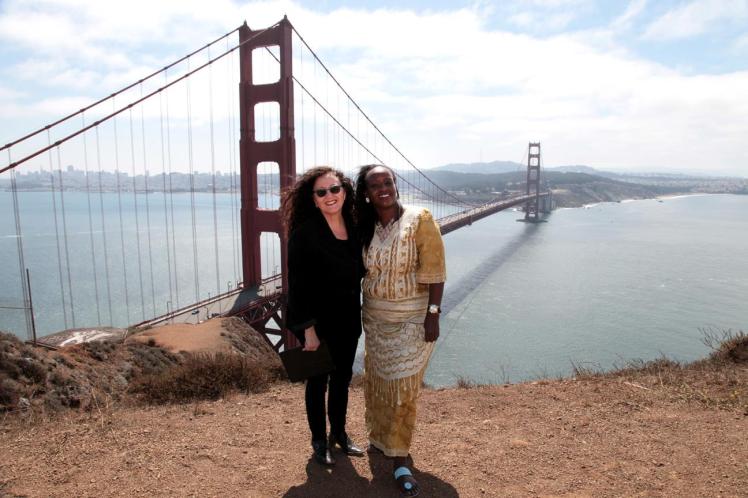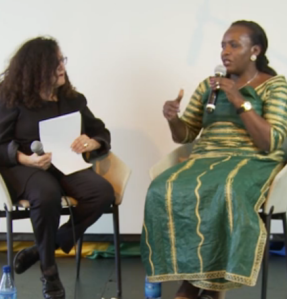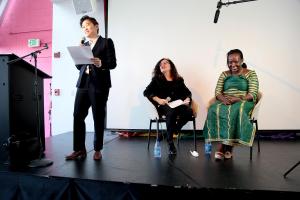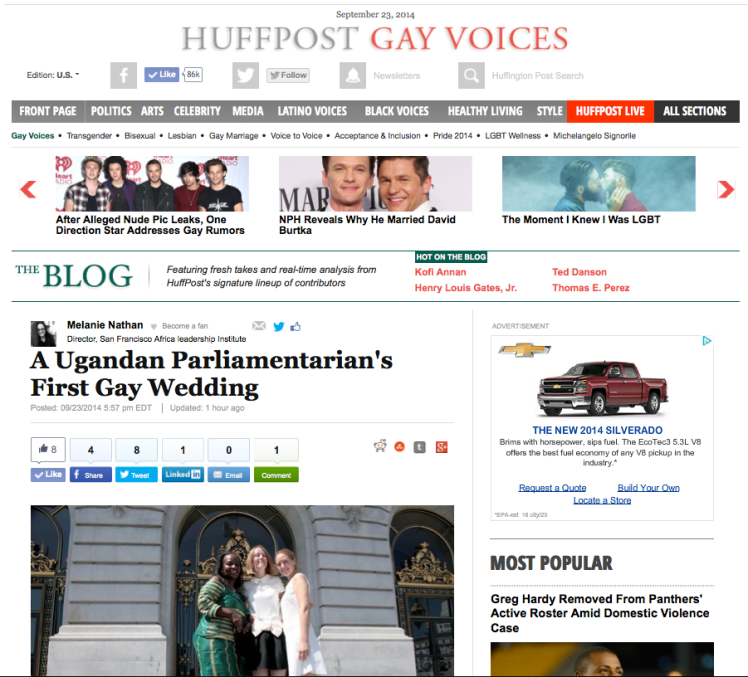Bridges between San Francisco and Kampala
By Melanie Nathan, September 20, 2014.

On the day that the majority of Ugandan Parliamentarians signed a petition to bring back the Anti-Homosexuality Act (AHA), which had been invalidated by the court, one unexpected Member of Parliament made a disappointing about turn. Honorable Nabilah Naggayi Sempala, woman MP for Kamapla, who had purposely stayed away from Parliament to avoid voting for the Anti Homosexuality Act (AHA) back in December, 2013, signed the petition to bring it back.
Much to the dismay of the LGBTI community in Uganda, the perceived ally seemed to change her stance, seemingly endorsing her support in a video taped press conference that followed.
I called Hon. Sempala personally. She told me that she had signed the petition under extreme pressure, emerging from a shadow cabinet meeting, to the waiting arms of press and opposition, with fellow MP’s from the majority ruling party, NRM, insisting that if she did not sign the petition, she would be “working against the people and not for them.”
After speaking to her, I realized that she had a lot to offer toward dissecting the complex milieu surrounding the AHA. I invited her to San Francisco, on her way back from the UNAA conference in San Diego, to meet with politicians, leaders and to engage in dialogue at a forum open to the public, through the pilot organization I am directing, The San Francisco Africa Leadership Institute (SFALI).
Before extending the invitation I checked in with prominent and also grassroots members of the LGBT community in Uganda; not one criticized the event, some endorsed it and submitted questions that they wanted answered publicly.
When we spoke on the phone, Hon. Sempala told me that she believed that her already controversial seat was at risk, as well as her personal safety, and with hardly much time to think, she signed, and was ushered into a press conference where she, in her words, “cynically” noted that she was “pleased if the Bill came back, and only if it were to include heterosexual males who practiced sodomy with their wives.” She informed me that she realized that parliament and churches would never support such an extension to the AHA. She felt that in effect, her caveat would nullify her perceived support. However that explanation may not seem to provide an easy understanding for those witnessing the edited video unless one heard Sempala’s explanation directly and one had some sense of the political climate.
After appending her signature to the petition, Sempala said that she regretted her political acquiescence. She reiterated this in the forum in San Francisco. See Video #1 at below.
Many were disappointed that she did not show courage and that’s she gave in politically to the pressure. “She is no hero,” said a Ugandan LGBT human rights defender, “but maybe she did it for politics. I still hope she is our friend.” Sempala pointed out that it is much easier for MPs from rural areas, where English, the language of media and Parliament is not spoken, to stand against the Bill, than it is for those who are in major centers like Kampala, where English is understood.
The Bill has been a political tool used for years by Ugandan politicians, to suit their purposes, tapping into its huge popularity amongst the Ugandan populace.

By virtue of the passing of the Act and Museveni’s assent, it is clear that the forces within Uganda and abroad, seeking to thwart its initial passage, were unsuccessful. In many instances we may have added fuel to the fire or provided the impetus for what became America vs. Uganda. (See Time interview with Opeyo- http://time.com/3092014/uganda-anti-gay-lgbt-lawyer/ )
Sempala made a very difficult, nonetheless still shameful choice, in that moment, when she signed the petition, even though she applied her cynical caveat. However, perhaps we ought to focus on the future and the measure of hope that she expresses in her deep regret at the political decision. Signing the petition is far off from voting for the Bill, which Sempala assured she will not do. See Video #1, below.
When Sempala came to San Francisco she received a friendly welcome by all who met her. One local, Julie Dorf, tried to create a controversy and derail Sempala’s visit, by contacting the Center, the Arcus Foundation and the Bay Area Reporter, calling Sempala a “homophobe” and saying she should not be given a “platform.” Dorf was actually quoted in the Bay Area Reporter calling Sempala a “homophobe.”
The same Julie Dorf called me back in 2010, when David Bahati, the rabidly homophobic Ugandan MP, who authored The Anti-Homosexuality Bill, known then as the “Kill the Gays Bill,” entered the USA and appeared on the Rachel Maddow Show. At the time I was working with the leadership of GetEQUAL, to protest his visit. However, we were talked out of the protest by Dorf – who told us that it was best to allow Bahati to speak on the Maddow show, unhindered. Bahati called me when he got back to Uganda and said that he left the United States believing that most Americans were for the AHA because we did not care enough to protest. I regretted listening to Dorf at that time. I find her current stance uninformed and hypocritical.
Having personally experienced Sempala and watching her interactions with numerous LGBT people, I do not believe she should be characterized as a homophobe and I do not find such derogatory and negative activism responsible.
Sempala’s appearance did not give her a “platform” in the U.S.A. It gave us an important insight, created bridges and provided Sempala with a deeper understanding of LGBT people.
If one were to believe the Dorf assertion then, one must believe that when Bahati appeared on Maddow, back in 2010, that too was a platform. I do not agree with that assessment. Dialogue toward understanding and constructive engagement is much different to platforms. And platforms are not platforms, unless there is something to be gained toward the agenda of the person who has the stage.

There is no benefit to Sempala speaking openly on American soil. It does not help her back in Uganda in any way. It certainly does not serve her political future back home and actually works to hurt her. It is for this reason I believe she truly feels remorse. But of course time will tell – if the Bill does come back, we will have to wait and see if Sempala votes for it or not.
In fact what she said here could be dangerous and used against her back home. When asked if she feared reprisal back in Uganda, she answered that people back home would simply think she was “paid off by the gays,” to express her progressive support. She also noted that while people expect her “to walk through the fire, they fail to provide her with access to a fire extinguisher.” The path of a woman MP is complex and much different to male counterparts in the Ugandan patriarchal Parliament, and the Sempala visit helped us understand the challenges and complexities, all of which should be carefully considered when some lean toward applying western neo-colonialist impositions on Africa. (See Video #2, below)
Though some may see Sempala as the enemy, I see her as an ally, who made a political choice that stings and hurts those she really would prefer to help. I see former President Clinton as a friend who had to make difficult and shameful political choices, which served to sting and hurt those he would like to have helped. (Circa 90’s DOMA and DADT.) I certainly would not have withdrawn my Clinton support because of his political choices, given the alternatives, any more than I would refuse to dialogue with Sempala. Lest we fail to note that the risks to former President Bill Clinton were not quite as severe as they are to Sempala and her family in the Ugandan context.
The Visit:

I took Hon. Sempala on a tour of the city, including the Golden Gate Bridge, twin Peaks and then the Castro. We held an informal luncheon at a Castro restaurant for a few local women leaders. On Thursday I took her to City Hall where she witnessed a lesbian wedding, met some same-sex couples, heard the Harvey Milk story for the first time and had a meeting with a local politician. On Thursday evening we held the forum at the SF LGBT Center.
Hon. Sempala told me that her visit to San Francisco and meetings with the community were “life-altering”. She was intrigued by the Castro and seemed taken with the fact that it is considered an LGBT neighborhood. She walked around, tasted the fare, looked into stores and noted the prevalence of all the rainbow flags. In doing so, she commented on how difficult it is for people in Uganda to get to know LGBT people, as people do not come out for fear of anti-gay retaliation. She said meeting gay couples has been eye opener and noted that if more could have this experience, it could definitely dispel the myths and lies fed to Ugandans about LGBT people.
After our walk she met several women leaders at a private luncheon in the Castro, where she explained in detail the difficulties for women members of Parliament as well as the plight of women in general, as a marginalized discriminated against community in Uganda. The women attending the event all commented on how much they learned from the experience.
The following day I took her to City Hall. On our way into the building a lesbian couple emerged who had just been married. She approached them, congratulated them and asked if she could be photographed with them. They agreed and exchanged names and contact e-mails with her. Inside the rotunda we came across a marriage about to take place and she asked for permission to attend. The couple agreed and we photographed her as she witnessed the entire ceremony.

She commented at the forum later that day: “I saw the joy in their eyes; everyone should have the right to such happiness.”
The dialogue and meetings proved to be a learning experience for those who encountered Hon. Sempala as well as for the MP herself. While the ultimate results of the visit remain to be seen, she provided much useful insight, engaged in critical dialogue; we opened doors and established bridges.
I practiced law in South Africa during the apartheid era and learned from my hero Nelson Mandela that engaging and even dining with enemies, perceived or real, are important concomitants of effective advocacy. Mandela said: “If you want to make peace with your enemy, you have to work with your enemy. Then he becomes your partner.”
I cite this for those who have perceived Hon. Sempala as the enemy. I truly believe we have an ally, desperately trying to survive a torrid political realm. Given this deeper understanding, through building bridges, there is much we can do differently that may serve to help, rather than to harm. It is my belief that Hon. Sempala, if given the opportunity, will vote against the AHA or certainly not be present to cast a vote. In the meantime I am aware that there is much work yet to be done and that work needs to be organic to Uganda and not entirely dependent on what the politicians do – I hope that those in the global arena, who have subscribed to neo-colonialist principles in their advocacy, will wake up to the reality that there are other paths.
Video and Article and pictures: Copyright of Melanie Nathan 2014© MAY NOT be used without permission
Please view these two videos which are cuts from almost 2 hours of filming:-
Video 1: THE SIGNING OF THE PETITION TO BRING BACK THE AHA
Sempala Video 1 from SFALI on Vimeo.
Video 2: ABOUT WOMEN AND KAMPALA WOMEN’S MP
Sempala Video 2 from SFALI on Vimeo.
Videos: Copyright of Melanie Nathan 2014© MAY NOT be used without permission
Note:
For those who read the Bay Area Reporter Article about the Sempala visit, please note the comments have all been removed by the Bay Area Reporter – Hon. Sempala had also commented on the post. I have screen shots of the comments if anyone would like to see them. Kindly request at [email protected]
Regarding he BAR article: From information which I have, it seems the slant of article was pitched to the editor by Julie Dorf, whose irresponsible, insulting and disrespectful remarks are quoted in the article. What is also important to note is that the reporter who was assigned to the Article, David-Elijah Nahmod says he was “fed” the questions to ask. He has never reported on African global LGBT issues including Uganda. His lack of understanding is clear from the article, through failures to contextualize and his critical inaccuracies. Cynthia Laird, who told me she edited the article, said she would correct the inaccuracies. Its been 4 days and I do not see the correction.
READ MORE:
Contact Melanie: [email protected]
Tweet @melanienathan1
Facebook:
https://www.facebook.com/melanie.nathan1
or
https://www.facebook.com/pages/Melanie-Nathan-Advocacy/253495108038074
READ HUFFPO VERSION HERE http://www.huffingtonpost.com/melanie-nathan/a-ugandan-parliamentarian_b_5865656.html

Melanie- as long as your guests understand how “outed” they are in these conversations- all good.
I cannot imagine being in SF & then travelling back to face their SA countries fear- mongering countries….